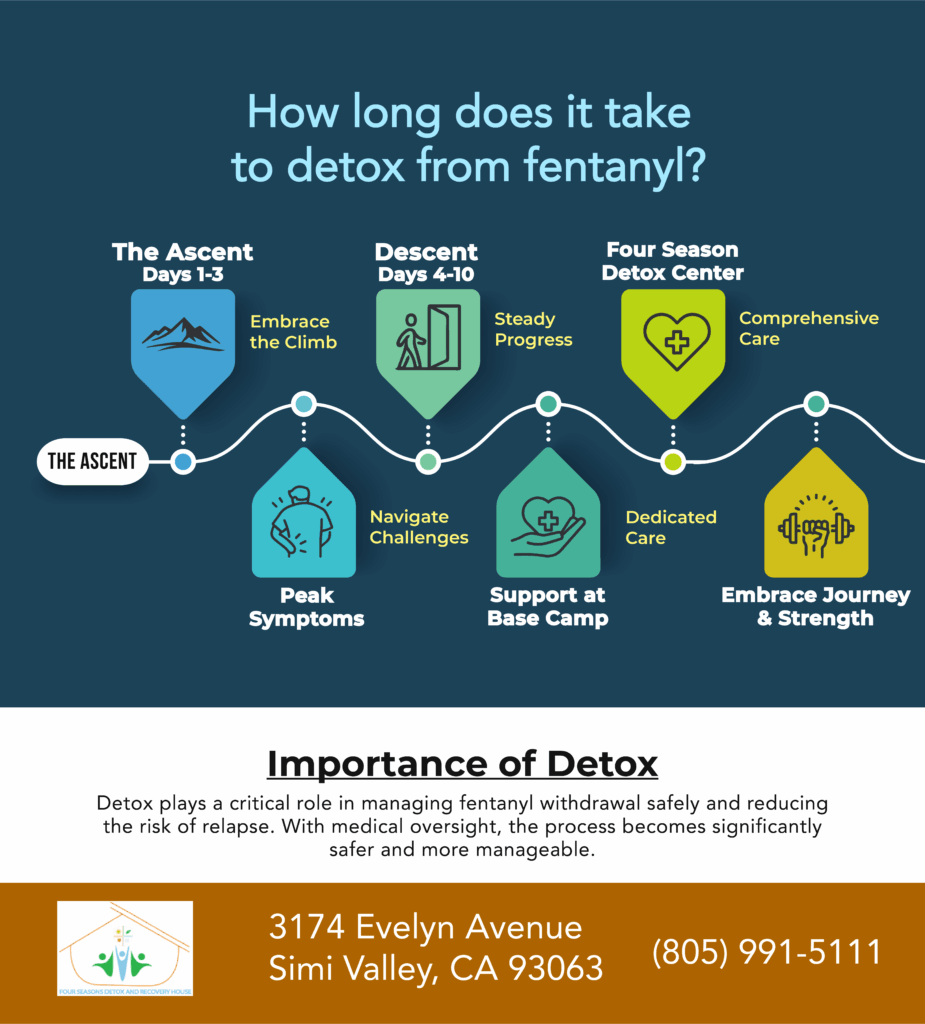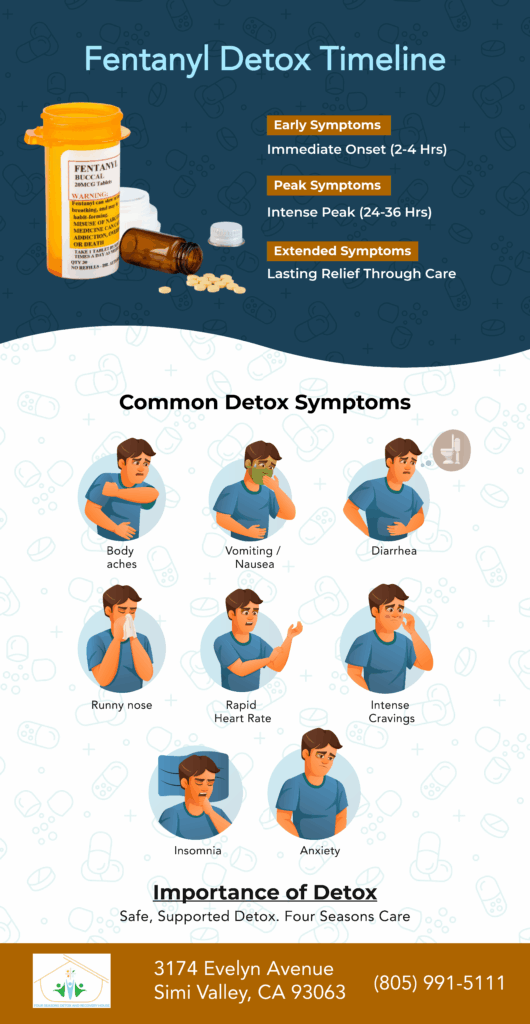How long does it take to detox from fentanyl? While the exact timeline varies, clients in a professional program usually stay in detox for about 3-10 days. Fentanyl’s unique pharmacology, where it is stored in the body’s fat tissues, can lead to a prolonged and severe withdrawal that is dangerous to manage without professional help. At Four Seasons Detox, our medical team provides 24/7 monitoring and medication-assisted treatment (MAT) in a luxury setting to help you get through withdrawal safely and successfully. Call us at (805) 991-5111 to start recovery.

In 2024, 0.3 percent of United States residents aged 12+ had misused fentanyl in the past year. Fentanyl is a highly addictive opioid drug that can lead to dependence quickly. Misuse, abuse, or addiction to the drug can start in many different ways. However, it is more than possible to recover. Detox is often the first step. So, how long does it take to detox from fentanyl?
Four Seasons Detox is a top-rated detox and addiction treatment center in California that treats opioid addiction and other substance use disorders. We’re here to answer your questions about fentanyl detox and help you get through it.
How Long Does It Take to Detox from Fentanyl?
How long does it take to detox from fentanyl? It depends, but there is a general timeframe that can help you understand what to expect.
Withdrawal from short-acting opioids tends to cause symptoms for around 4-10 days, whereas detox from long-acting opioids tend to last for about 10-20 days. Since there are different modes of administering fentanyl (e.g., slow-release patches vs. pills or injections), factors such as how you use fentanyl may affect how long fentanyl detox takes for you.
Opioid withdrawal symptoms, including those from fentanyl, tend to start pretty quickly. Often, less than 24 hours after your last dose. Once it is safe to do so, treatment professionals in a detox program can provide medications to help you get through the opioid withdrawal process.
As your symptoms start to decrease in severity, professionals can lower your dose of medications used during the withdrawal process.
Other Factors Affecting the Length of Fentanyl Detox
Aside from formulation and administration, additional factors can influence how long fentanyl detox takes for you. Other factors affecting the length of fentanyl detox include:
- How much fentanyl you use.
- How often you use it.
- Your overall health.
The detox program at Four Seasons Detox can help you get through fentanyl withdrawal safely and successfully.
Luxury Detox in Ventura County
Our luxury detox in Ventura County provides inpatient withdrawal management in a high-end, amenity-rich environment. We provide a personalized approach, understanding that everyone’s detox timeline is a little bit different. Medication, hydration support, and other treatments are used as needed. Staff members are present 24/7.
The Four Seasons Detox team will monitor your fentanyl detox symptoms until you achieve physical stability and are ready to move on to the next stage of the recovery process. Most clients are in detox for about one week.
Inpatient Drug Rehab in Ventura County
Our inpatient drug rehab in Ventura County provides comprehensive therapy for opioid addiction and other substance use disorders. This program lasts for about one month. During that time, you’ll participate in a rich schedule filled with groups, individual therapy sessions, life skills workshops, 12-step meetings, creative therapies, recreation, and other activities while living on-site at our treatment center.
Therapy sessions help you build lasting recovery skills and meet personal goals, while the structure of the program helps clients build healthy routines in a drug and alcohol-free environment. All clients get personalized treatment plans to accommodate their unique needs.
We have comfortable rooms and extensive amenities, including but not limited to a swimming pool, fitness facilities, indoor and outdoor communal spaces, and nutritious, chef-prepared meals.
Dual Diagnosis Treatment
Some people overcoming fentanyl abuse will have a co-occurring mental health condition, such as depression or anxiety. Four Seasons Detox provides effective dual-diagnosis treatment at all care levels for clients with co-occurring mental disorders. By doing so, we promote positive outcomes, such as an improved quality of life and better psychiatric functioning.
Medication Assisted Treatment
Some people overcoming opioid use disorder, which encompasses fentanyl addiction, will benefit from medication-assisted treatment (MAT). We provide access to MAT as needed, when it is suitable for the client.
Call Four Seasons Detox for Help With Fentanyl Withdrawal and Addiction Recovery
The Four Seasons Detox team is here to help you through every stage of the recovery process. We provide luxury detox and addiction rehab services for people facing fentanyl addiction and other types of substance abuse. Call Four Seasons detox for help with fentanyl withdrawal and addiction recovery today at (805) 991-5111.




